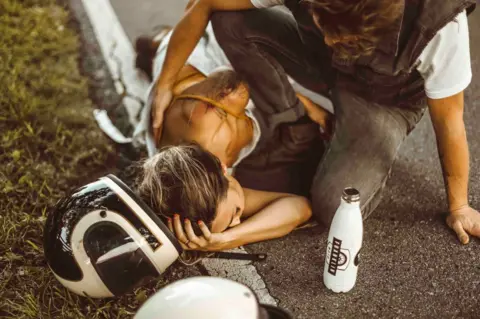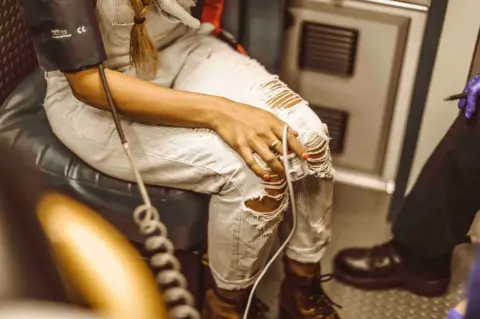Instagram influencers: Have we stopped believing?
 Lindsey Grace Whiddon
Lindsey Grace WhiddonLast month, Nashville Instagrammer Tiffany Mitchell posted photographs of herself lying by the side of the road. She wrote that they were taken following a motorbike accident.
But after an initial wave of sympathy from her (then) 211,000 followers, the doubtful comments began to trickle in. And then the floodgates truly opened when Buzzfeed ran a story about it this week.
Given the traumatic nature of a road accident, the photographs were just so… beautiful. But there also appeared to be discrepancies.
She appeared to have more than one helmet. Where was the blood? Why did she name-check her tattoo artist in her post (she said her flowers may need a "touch-up") and - even more crucially - why was there a prominently branded bottle of water in the forefront of one of the shots?
Tiffany Mitchell has now been accused of making the whole thing up as a publicity stunt. She claims to be receiving death threats as the backlash intensifies.
Her friend Lindsey Grace Whiddon was the photographer who was with her that day.
"Looking back at the photos, I can see why they seem so staged and, if I hadn't been there myself, I might also have a hard time believing they weren't," she told me.
"I can tell you on my own personal and professional integrity that not only were they un-staged, Tiffany had no idea they were being taken until hours later."
Tiffany later removed the post, and uploaded a video defending herself.
I asked her if she wanted to talk to the BBC. She was emotional, her sentences peppered with words like "vulnerability", "openness", "true" and "healing".
She told me her boyfriend, James Cloninger, was killed in a motorbike accident in 2016. Some of her Instagram posts refer to their relationship, and her grief.
 Lindsey Grace Whiddon
Lindsey Grace WhiddonShe denies staging her crash, which she says happened when she took a bend too fast on a country road in Tennessee. She and Lindsey sent unpublished photographs to the BBC showing the police and an ambulance - a Google image search and the data inside the photos themselves indicates they are originals.
She said the ambulance was called by a passer-by and her wounds were dressed but that she declined to go on to the hospital because she was not displaying any symptoms of concussion (although these can develop later on).
She also maintains she only removed her helmet at the roadside once she had calmed down and realised she was all right, and the other one belonged to her friend, the man in the photo.
"I have no idea how anyone could believe that this was staged or being exploited for attention for a brand campaign," she says.
"I am 100% always honest about my brand collaborations… if a product is being shared because a company wanted me to share it, I disclose every time."
She said the water was handed to her and "could have been any brand".
The brand was in fact SmartWater, which is owned by Coca Cola. It is not featured in the photo above.
"SmartWater does not in any capacity have a relationship with Tiffany Mitchell," it said.
Tiffany told me she has been "horrified by the hatred" that has come her way since Buzzfeed ran its story, which it says she asked them not to publish.
"It's very sad to me that so many are so blindly believing what they read about this that they aren't even considering that they may be attacking someone who actually did experience a motorcycle accident that caused injuries and triggered real trauma," she says.
 Lindsey Grace Whiddon
Lindsey Grace WhiddonWhether you believe her side of the story or not, the reaction to it suggests people may be becoming increasingly cynical about what they see on Instagram.
There are continuing examples of Instagrammers failing to declare when their posts are sponsored by the brand they are promoting and not a spontaneous expression of their own personal preference.
Just last month an Instagram post by UK reality star Jemma Lucy was banned by the Advertising Standards Authority - it featured her drinking a branded weight loss coffee while pregnant.
The ASA said not only did it break several rules, including encouraging unsafe practices during pregnancy, but it was also not identified as an advert. She said she had not been paid.
 Jemma Lucy
Jemma LucyAnd then there are those who like to pretend they have brand collaborations even when they don't - in December the Atlantic ran a feature about fake sponsored content.
"In the influencer world, it's street cred," Brian Phanthao told reporter Taylor Lorenz.
"The more sponsors you have, the more credibility you have."
And who can forget the disastrous Fyre Festival, about which two documentaries have now been made, because it was promoted as "Instagram comes to life" - and in the end it was cheese sandwiches and flooded tents? The organiser of that is now in prison for fraud.
Then there's what the followers actually want to see.
"Audiences might say they want more reality but when it comes to what's being shown to them on the feed, what people choose is the really beautified version of reality," says Sara Tasker, Instagram coach and author of Hashtag Authentic.
"They don't want to see the washing-up, the cat sick, the kitchen sink."
 Getty Images
Getty ImagesInfluencers are constantly working Instagram's algorithms in order to boost their followers and make them more marketable - and that means it's a popularity game.
"From an influencer's perspective you want to post things the audience want to see because it gets more promoted if more people are looking at it."
Influencers also get a harder time than celebrities in terms of their credibility, Ms Tasker says.
"I think there's an unfair sense that influencers have no talent beyond content creation, so we hold them to much higher standards in their work.
"In my experience, celebs are far worse for disclosing brand partnerships and misleading audiences, but aren't held to account by their followers in the same way."
The exposure ultimately doesn't seem to have done Tiffany Mitchell any professional harm - at the time of writing, she had about 4,000 more followers than she did when I first contacted her.
She says she will continue to post.
"I'll keep sharing like I always have and be as responsible as I can with every word and every picture," she said in her last email to me.
